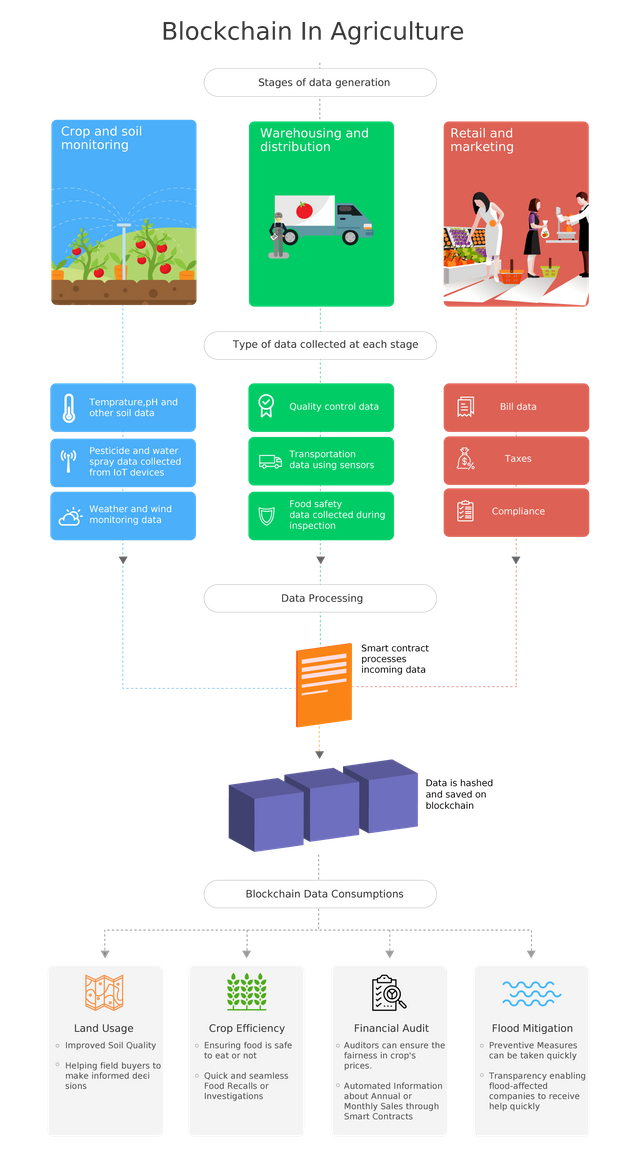How will Blockchain Agriculture revolutionize the Food Supply from farm to plate?
With 40% of the global workforce, agriculture sector presents 6.4% of the entire world’s economic production and its total worldwide production is $5,084,800 million. If you have ever visited a farm, you would have seen that farmers have complicated ecosystems with seasonal financing structures, careful timing and a lot of moving parts.
Uses Cases of Blockchain in Agriculture

After the food leaves the farm for the market, it becomes a part of the vast supply chain involving a lot of intermediaries. Everyone would like to know where the food has been produced before it is served on the plate.
What if you could check the quality of food before you eat it? It could become possible with the use-cases of blockchain in executing contracts and tracking information transparently.
Blockchain agriculture is one of the compelling use cases that makes the process of growing and supplying food simpler. The agriculture supply chain can provide all involved parties with a single source of truth.
Read the article further to how blockchain agriculture will revolutionize the food supply from farm to plate?
According to ReportLinker, the blockchain in food supply chains and agriculture is estimated to be USD 60.8 million in 2018 and is projected to reach USD 429.7 million by 2023. The Dutch Ministry of Agriculture, Nature and Food Quality financed the first research project, “Blockchain for Agrifood” that has been proposed to explore blockchain implications for agrifood. Pilot studies indicate that blockchain technology enabled food to be traced from farm to grocery store in just a few seconds.
Blockchain also helps to keep tabs on abundant commodities and reduce cases of illegal harvesting and shipping frauds. The United Nation reveals that food frauds cost the global economy around $40 billion per year because of illicit trades.
Following are the key ways for how blockchain is transforming the agriculture industry:
1. Procurement Tracking
The challenge for the agriculture sector is to track and pay for the delivery of foods. Nowadays, the process depends on a third-party for coordinating the goods delivery. The sellers usually have an agent who ensures that the goods are delivered safely and buyers have an agent to recommend payment and audit the delivery.
The involvement of multiple agents add high costs to the system and makes the entire process time-consuming. With the blockchain, the whole process can be simplified to a single distributed ledger.
Commodity buyers can directly interact with the supplier that speeds up the process and reduces the time to settle a payment. Also, the companies can save on additional agent fees and farmers can receive a larger share of sales directly with a blockchain based solution.
With the features like traceability and auditability, farmers can directly sell crops or food to the restaurant or individuals without the need for intermediaries.
2. Crop and Food Production
With the help of smart farming, IoT sensors could fetch important information like the temperature of the soil, water level, fertilizer details and more and send it to the blockchain. Based on the data saved in blockchain, smart contracts could trigger and execute the specific actions. It will help in enhancing the quality of the farming process as well as produced crops.
3. Weather crisis control
Farmers have to face the issues of unpredictable weather conditions throughout the year. Monitoring and predicting such factors can be crucial for better crop survival.
Due to excessive rains, it becomes difficult for grown crops to tolerate flooding. Consumers are never aware of when did the crops suffer bad weather conditions and why did market face high surge pricing.
As it is possible for the involved members to trace the weather conditions from the blockchain solution, farmers can quickly request and receive insurance claim through smart contracts.
4. Managing Agricultural Finance
Lack of transparency in credit history and agreements are some of the significant problems confronting between smallholders and financial inclusion. Today, financial services do not only allow smallholders to invest in farming but also help them in resolving liquidity constraints.
As a result, it becomes challenging for buyers to pay farmers, restricting smallholders to sell crops at comparatively lower rates. With blockchain, the agricultural finance process becomes more transparent and fair, yet enables shared control accessibility.
The agriculture industry needs to do a lot of work to maintain and build consumer trust when it comes to the food quality check. A blockchain based agriculture solution holds a lot of promise for the agribusiness industry with its ability to bring transparency in the system.
Contact our team of Blockchain Experts to get a better understanding of the blockchain implementation in agriculture industry.
Note: Above article has been posted originally at Hackeernoon.
Probably going to need to prove that this is your article on hackernoon....
Hi! Thanks for your quick attention.
However, one can check the authenticity of the article by cross validating that article which has been posted originally at Hackeernoon by brand LeewayHertz itself.
Thanks for letting us know.
https://twitter.com/AIMStockWatcher/status/1156556920351797253
Congratulations @leewayhertz! You have completed the following achievement on the Steem blockchain and have been rewarded with new badge(s) :
You can view your badges on your Steem Board and compare to others on the Steem Ranking
If you no longer want to receive notifications, reply to this comment with the word
STOPVote for @Steemitboard as a witness to get one more award and increased upvotes!